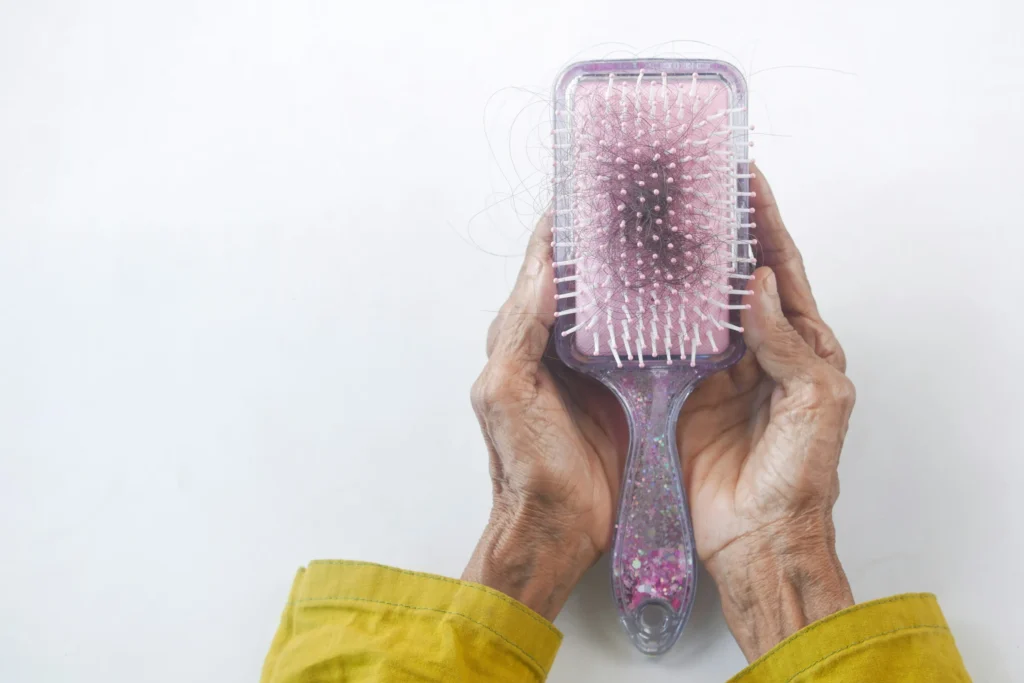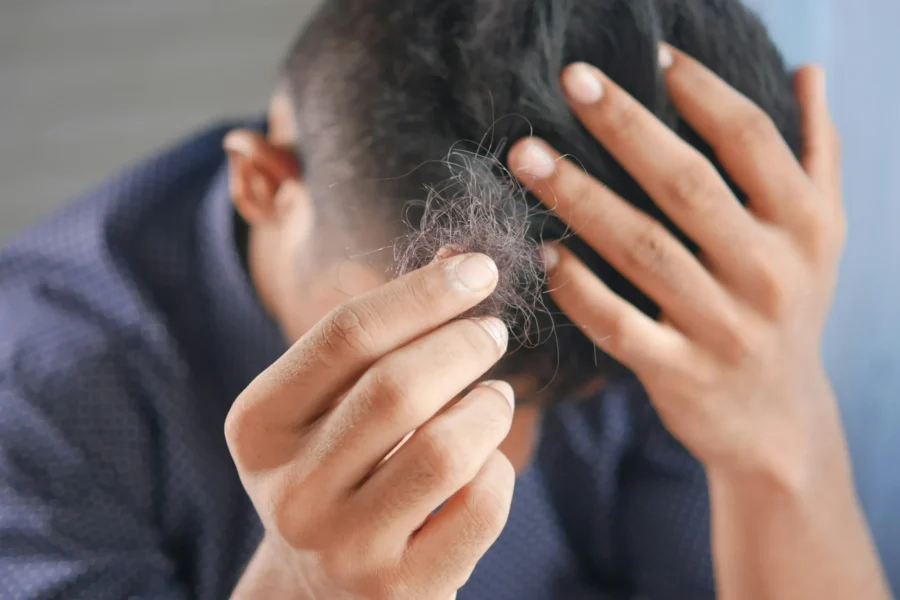Medication should make us feel better. However, occasionally, they have side effects we would not anticipate; one of the more annoying ones is hair loss. You are not alone if you have found your hair thinning or falling out since beginning a new medicine. The encouraging news is Usually transitory; it will pass after you stop using the drug, and your hair will grow back.
How Does Medication Cause Hair Loss?
Firstly, you should know a bit about hair growth to appreciate how medicines might cause loss. Hair naturally cycles in two main phases:
- Your hair is in the anagen phase—that which is actively developing. This period lasts two to seven years.
- Your hair breaks and rests in a telogen phase for roughly three months before finally falling out.
Medication can throw off this process, either stopping new hair from developing completely or causing early hair loss. At that point, you start to see more strands in your shower drain or brush.
Types of Medication Cause Hair Loss
Telogen Effluvium: The Most Common Culprit
Include medication; hair loss most often falls under this category. Telogen effluvium results from your hair follicles being driven into their resting phase too quickly. Usually, you might lose about 100 hairs a day; however, with telogen effluvium, that figure might soar to 30% to 70% more.
Two to four months after beginning a new treatment, you may start to see further shedding. Don’t fear, though; most cases of this kind of hair loss are transient; if your body adapts or you stop using drugs, your hair should revert to normal.
Anagen Effluvium: The More Intense Hair Loss
Usually occurring during the active growth phase of your hair cycle, anagen effluvium has a somewhat more potent effect. This kind of hair loss can strike rapidly, sometimes within days or weeks after beginning a medicine.
Many times, this is noticed in those undergoing chemotherapy; hair loss can be really severe. You could lose hair from your eyebrows, eyelashes, and even body hair in addition to your scalp. Again, this hair loss is usually transitory, and once therapy stops, your hair will begin to grow back.
What Types of Medication Can Cause Hair Loss?
Unbelievably, many drugs can cause hair loss. The most often occurring offenders are listed here:
- Retinoids, vitamin A, acne treatments
- Antifungals and antibiotics:
- Medications used to treat depression
- Birth control capsules
- Blood Thinners
- Drugs low in cholesterol
- Chemicals used in cancer treatment, like chemotherapy
- Epileptic medications, sometimes known as anticonvulsants
- ACE inhibitors, diuretics, beta-blockers—blood pressure drugs
- Replacement of hormones in treatment
- NSAIDs, often known as nonsteroidal anti-inflammatory medications,
- Medications Steroids
- Thyroid medicines
- Medication for weight loss
Remember that certain drugs cause hair loss, and not everyone suffers. It usually relies on your body’s response, the dosage, and your length of medication use.
Chemotherapy and Hair Loss: The Hard Facts
You have most certainly previously been advised about the likelihood of losing your hair if you are on chemotherapy. Although their intended target is fast-growing cancer cells, chemotherapy medications can also harm other fast-growing cells in your body, including hair follicle cells.
Usually beginning two weeks following treatment, chemotherapy-related hair loss can advance rapidly. In a month or two, many people lose most, if not all, of their scalp hair. The fantastic news is Once treatment ends, your hair almost always comes back; the colour or texture may vary somewhat when it first returns.
How to Treat Drugs Causing Hair Loss
See your doctor first if drugs are causing your hair loss. They can go over your meds and determine whether there is a relationship between them and your hair loss. Should your hair loss be minor, they may advise changing your dosage or switching drugs.
There are therapies available; nevertheless, should stopping the drug fail to address the issue or if your hair is not growing back as expected:
Finasteride (Propecia) and Dutasteride (Avodart): Often taken for male pattern baldness, finasteride (Propecia) and dutasteride (Avodart) can also help halt hair loss and encourage regrowth in drug-induced cases.
Minoxidil (Rogaine): Men and women can benefit from the over-the-counter topical minoxidil ( Rogaine), which aids in hair growth stimulation.
Wigs, caps, and scarves can be an excellent temporary fix for chemotherapy-related hair loss while you wait for your hair to grow back.
Tips for Dealing with Hair Loss Emotionally and Physically
Hair loss can be difficult for your self-esteem, yet there are strategies to help.
Be gentle with your hair
While your hair is frail, treat it gently; avoid over-styling, heat tools, and strong chemicals.
Embrace temporary fixes
While your hair grows back, you might have fun changing your appearance with wigs, caps, and scarves.
Stay healthy
A healthy diet can help hair regrowth, so pay special attention to meals high in vitamins, minerals, and protein to provide your body with the required nutrients.
Although losing hair due to medication can be annoying, the silver side is that it is usually transitory. Once you discontinue the meds, most of the time, your hair will come back on its own. If not, there are numerous therapies accessible to initiate regrowth.
Before changing your prescription, always see your doctor; don’t hesitate to investigate choices, including finasteride, minoxidil, or even a chic wig, to help you feel confident once again. Hang in there; your hair probably will return before you realize it!


